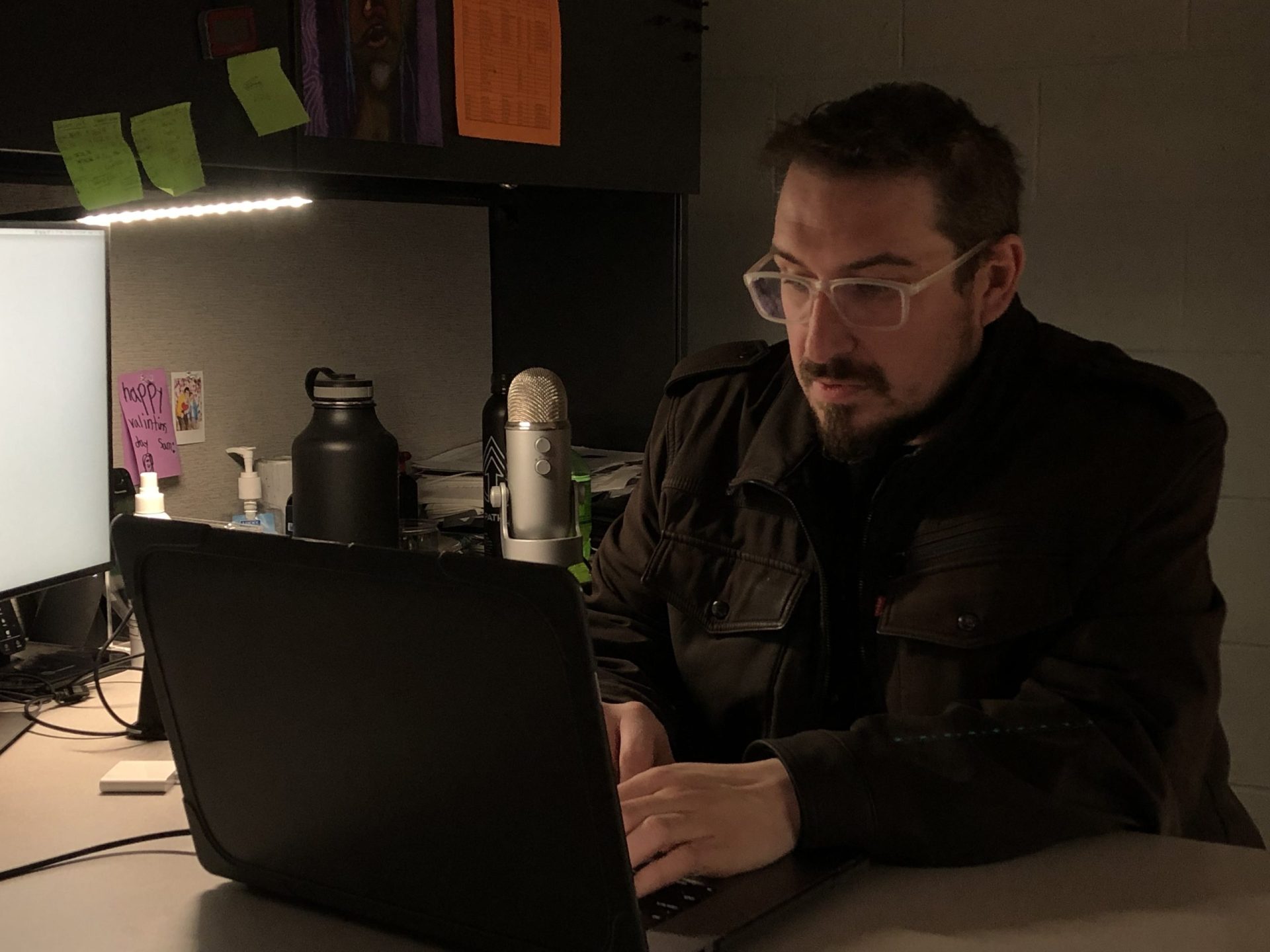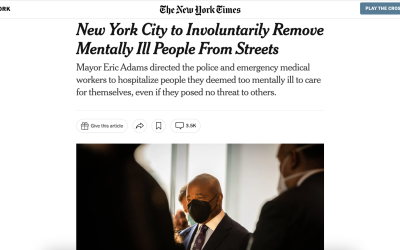When I was reflecting on the last two years, I frequently came back to my time spent in the art department. Sam Rapien, a professor of visual communication and design at UNK, found his own way through the pandemic with his unique approach and teaching philosophies. Below is an interview with Sam from November 11th, 2022.
You’re a proponent of placing yourself as a person first or taking care of yourself first and then having your role as a student or faculty member second. Is there a time in the past two years that you’ve realized that you need to put yourself first and were able to take that break when you needed to?
I mean, it’s definitely something that I try to be as much of a proponent for, especially with students, because I think a lot of times, students, especially, feel like they’re a student first in the classroom and then they’re maybe a person down the list. And for me it’s like, well, no, you need to take care of yourself first in order to be able to be a good student.
A lot of times, I give good advice, but I don’t always take my own advice very well. Especially with this job, it’s hard to turn it off. It’s not your typical 9 to 5, I’m still grading, I’m still planning for the next day. I’m trying to figure out how I can teach this idea better.
I feel it’s especially interesting that this is focusing on the last two years because I feel like that’s when I really hit a wall. Where the amount that I was doing, and especially when COVID hit where we quickly had to transition and rethink how we were doing things in the classroom. What I had prepared for face to face now all of a sudden had to be translated online, which I felt like I had to do double to triple the amount of work in order to figure out how to make that work.
Even as the pandemic began to wane, it was still trying to do all those things because I still found the benefits of them. Recording my lectures or really outlining exactly what needs to be done in an assignment step by step. So, all of those things I was continuing on top of trying to get back to normalcy and on top of just challenges within the department or whatever else was going on.
I would say last year, especially, really began to take a toll on my own mental health and my physical health was beginning to deteriorate. I think in some ways, kind of running myself into the ground was the moment for me, especially where I was like, “I really need to take a step back a little bit and start focusing a little bit more on self-care”.
I think hitting a point, hitting a wall, and then finally deciding the only way that I’m going to be able to help myself because you know there’s always gonna be things to do. No one is going to help you. You kind of have to do it yourself, and so for me a lot of it was like, “OK, I need to start setting some boundaries” I need to start saying I’m going to stop working at this time of night. There’s always going to be more stuff I have to do the next day. From there, then going back and doing some of the things that I love or that I get enjoyment out of. Really carving out that time in that space for myself. But I think a lot of that had to come from running myself into the ground first and then realizing, “oh, this is what happens when you go too far. Sam, you need to reel it in a little bit”.
Do you think the break improved your situation when you came back to your task, or just as a faculty member, as a professor?
Yeah, I mean I think so. I definitely began to feel a little bit more refreshed. In a lot of ways, in taking that time and having that time for reflection allowed me to see that I was maybe prioritizing or putting emphasis on things that maybe didn’t really matter all that much in the long run.
In some of that time too, carving out that space to not just keep doing, but reflect on what I was doing helped me to trim the fat a little bit. I think even just having that time to reflect and to be able to cut out some of the things that maybe we’re taking more time than what needed to be taken or just didn’t even need to be focused on at all. I think that was helpful.
Again, I wouldn’t say that the last two years have been a particularly joyful time for a lot of people. I think carving out and then trying to find joy in something else that I was doing allowed me to refresh a little bit and be able to come back into the classroom or to do my job. Just feeling a little less like burdened or weighted down and then also knowing, “OK, well, you know at 7:00 o’clock tonight I’m done like I’m just cutting myself off and then after that I’m going to continue playing this video game”. I think, for most people that’s common-sense stuff they just do, but especially in this job, you can always find something to do, and I think for me a lot of times finding that cut off was challenging but really beneficial, because I was like, “oh, I can do things that I love to do at night”. It sounds so simple, but that was helpful.
Did you struggle with maintaining that routine of saying, “no, I’m quitting at this specific time”?
Yeah, sometimes. Especially where if something else came up, maybe there was a committee or something like that I was having put a lot of time and effort into and then all of a sudden I started getting that like feeling like, “Sam, you’re falling behind on your grading”, then I would kind of blow past my own boundary and then get caught up on something. I think it was difficult to maintain at first, but the more that I stuck to it, the easier it was for me to really look forward to it and then uphold my own boundaries.
How did you come up with this philosophy and do you think it will stay the same? Or will it adapt with new generations of students? Because I know a lot of new students coming into college have that burnout mentality already.
Yeah, yeah, I mean, I’m very transparent about this, but therapy really helped me. Just cognitive behavioral therapy. Having that objective look in and being like, “Sam, you’re burning yourself out because you don’t have these boundaries”. Even just having that reinforcement. To have someone else also tell you, “no, you need to carve out this time for yourself or else it’s no wonder you’re feeling ill and you’re not as mentally clear as what you could be”. That helped reinforce and inform that philosophy of self-care and mindfulness. Just taking that time out for yourself.
This might be a side tangent, but I think what’s really interesting about Gen Z in general is that, stigma of mental health and therapy isn’t there. For the millennials, I think we were better about it than Gen X and even the Boomers especially, who stigmatized and roll their eyes at the idea of depression or whatever else.
One of the things that I’ve found, this might be more of a discussion point, I’m curious what you think about this, but what I found is, in talking to some of my students when it comes to their mental health. There’s still a reluctance to go to therapy, and instead they rely on their peer groups, so it’s a lot more like, “hey, we’re all struggling together”, but in some ways it becomes a cycle where it’s more commiserating than it is lifting each other up.
I try to be open about my own depression and anxiety and talk about how having that objective look in from a therapist can be really helpful and beneficial. I try to recommend to students the services on campus, and even if they can’t necessarily help, they can at least point you in the right direction. But there’s still this reluctance. Where it’s like, “I don’t need to talk to some stranger, I got this group of people who are all struggling with the same thing”, but not getting anywhere in that struggle. I think that it’s challenging, especially where students are coming in with that burnout already. If there’s not that help or push forward, then I’ve seen a lot of students just get mired in it where it’s just this cycle of, “I can’t get out of this” and then the work suffers, they don’t meet deadlines, and that compounds.
I see maybe the bigger challenge is trying to connect them with the right resources to get them out of the rut that they’re in right now, rather than staying stuck in it.
I definitely agree. Students can acknowledge it and talk about it in the class or with peers, but then it almost seems that they’re reluctant to go or do something about it. Taking the time for self-care, they know they should, but they won’t.
That’s the interesting thing to me. There is such an openness about it, and I really appreciate that openness, but there does seem like this overall reluctance or “I don’t have time for this” or it’s a money issue or it’s something else. Even though there’s these resources that are available.
Another side tangent, I think that’s one of the things where we fail pretty miserably in education is that we don’t focus on those things. It’s always, “OK, you got this assignment, now you got this deadline”, but we don’t teach time management. We don’t teach coping skills. We don’t teach mindfulness. We don’t do anything about self-care. There’s this constant pressure and you either deal with it or you become apathetic towards it. We don’t teach how to manage any of these things, and even me going into my 30s into my 40s, it’s taking me this long to begin to figure it out.
This interview has been edited for length and clarity.




You took such a cool approach to sharing the interview you had with Rapien! The structure that you used makes it easy to read and follow with what he is saying. I also appreciate how you have seemingly cut the interview into two posts, it’ll be interesting to see if they are connected or stand alone as separate stories!